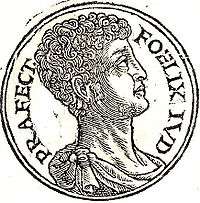Antonius Felix


Obverse: Greek letters ΝΕΡ ΩΝΟ Ϲ (Nero) in wreath.
Reverse: Greek letters ΚΑΙϹΑΡΟϹ (Caesar) and date LC (year 3 = 56/57 AD), palm branch.
Marcus Antonius Felix (Felix in Greek: ο Φηλιξ, born between 5/10-?) was the Roman procurator of Iudaea Province 52-58, in succession to Ventidius Cumanus.
Life
Felix was the younger brother of the Greek freedman Marcus Antonius Pallas. Pallas served as a secretary of the treasury during the reign of the Emperor Claudius. Felix was a Greek freedman either of Claudius, according to which theory Josephus (Antiq. xx. 7) calls him Claudius Felix, or for Claudius's mother Antonia Minor, a daughter of Triumvir Mark Antony to Octavia Minor and niece of Emperor Augustus. According to Tacitus, Pallas and Felix descended from the Greek Kings of Arcadia. Felix became the procurator by the petition of his brother.
Felix’s cruelty and licentiousness, coupled with his accessibility to bribes (see Book of Acts 24:26), led to a great increase of crime in Judaea. The period of his rule was marked by internal feuds and disturbances, which he put down with severity.
After Paul the Apostle was arrested in Jerusalem and rescued from a plot against his life, the local Roman chiliarch Claudius Lysias transferred him to Caesarea, where he stood trial before Felix. On at least one further occasion Felix and his wife Drusilla heard Paul discourse, and later on frequently sent for Paul and talked with him (Acts 24:24-26). When Felix was succeeded as procurator, having already detained Paul for two years, he left him imprisoned as a favor to the Jews (Acts 24:27).
On returning to Rome, Felix was accused of using a dispute between the Jews and Syrians of Caesarea as a pretext to slay and plunder the inhabitants, but through the intercession of his brother, the freedman Pallas, who had great influence with the Emperor Nero, he escaped unpunished. Porcius Festus succeeded him as procurator of Judea.
Marriages and issues
Felix married three times. His first wife was Drusilla of Mauretania the Elder, daughter of Cleopatra Selene II and Juba II of Numidia, and sister to Ptolemy of Mauretania. Drusilla of Mauretania the Elder is often confused with her niece, Drusilla of Mauretania the Younger, daughter of her brother Ptolemy of Mauretania and Julia Urania. Felix' second wife was Drusilla of Judea, daughter of Herod Agrippa I and Cypros. Drusilla of Judea divorced Gaius Julius Azizus, King of Emesa to marry him. Felix and the Judean Drusilla, had a son, Marcus Antonius Agrippa, who died along with this Drusilla and many of the inhabitants of Pompeii and Herculaneum in the eruption of Mount Vesuvius on 24 August 79, and a daughter, Antonia Clementiana. The Judean Drusilla was one of only two major figures reported as dying in the eruption of Mount Vesuvius, the other being Pliny the Elder. Antonia Agrippina may have been a daughter from their son's marriage (this name was graffiti in a Royal Tomb in Egypt). Clementiana became a grandmother to a Lucius Anneius Domitius Proculus. Two possible descendants from this marriage are Marcus Antonius Fronto Salvianus (a quaestor) and his son Marcus Antonius Felix Magnus a high priest in 225. After the eruption, Felix married for a third time, but little is known about his third wife.
See also
References
- Tacitus, Annals, xii. 54, Histories v. 9
- Suetonius, Claudius, 28
- Emil Schürer, History of the Jewish People (1890–1891)
- Robertson, A. (1899). "Felix, Antonius". In James Hastings. A Dictionary of the Bible. II. pp. 1–2.
- commentaries on the Acts of the Apostles
- Sir W. M. Ramsay, St Paul the Traveller
- Carl von Weizsacker, Apostolic Age (Eng. trans., 1894)
- Jewish Encyclopedia: FELIX (ANTONIUS FELIX)
- https://web.archive.org/web/20040530071028/http://www.tyndale.cam.ac.uk:80/Egypt/ptolemies/ptolemies_selene_ii.htm
External links
- Livius.org: Marcus Antonius Felix
- Roman coinage of Felix can be seen under Roman Procurators at
![]() This article incorporates text from a publication now in the public domain: Chisholm, Hugh, ed. (1911). "article name needed". Encyclopædia Britannica (11th ed.). Cambridge University Press.
This article incorporates text from a publication now in the public domain: Chisholm, Hugh, ed. (1911). "article name needed". Encyclopædia Britannica (11th ed.). Cambridge University Press.
| Preceded by Ventidius Cumanus |
Procurator of Judea 52 to 58 AD |
Succeeded by Porcius Festus |